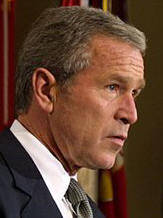Homeland Security Appropriations Bill
Purports to Restrict Use of Funds for CAPPS II
October 1, 2003. President Bush signed HR 2555, the "Department of Homeland Security Appropriations Act, 2004." The bill contains language prohibiting the use of funds for the Computer Assisted Passenger Prescreening System (CAPPS II) program until the General Accounting Office (GAO), which is an arm of the Congress, issues a report to the Congress in which it finds that the CAPPS II program meets certain specified criteria set out in the bill. However, while this language is in the bill, and the President signed the bill, the President wrote in a separate signing statement that this language of the bill is ineffective under the Supreme Court's opinion in INS v. Chadha. Bush wrote that while the language is mandatory, he will construe it as merely advisory.
Background. Before the terrorist attacks of September 11, 2001, the commercial airlines conducted passenger screening, and administered the CAPPS I, subject to federal guidelines. In late 2001, the Congress passed the Aviation and Transportation Security Act, which created the Transportation Security Administration (TSA) as a unit of the Department of Transportation (DOT). This Act gave the TSA responsibility for airport passenger screening. In late 2002, the Congress passed the Homeland Security Act, which, among other things, created the Department of Homeland Security (DHS), and transferred the TSA from the DOT to the new DHS.
The proposed new CAPPS II, the next generation passenger screening system, if implemented, would be a government (TSA) run system that replaces CAPPS I. However, it has been criticized and opposed by former Rep. Bob Barr (R-GA), the Electronic Privacy Information Center (EPIC), the ACLU, and others, on privacy grounds.
Section 519 of HR 2555. Section 519(a) of the appropriations act
provides that "None of the funds provided by this or previous appropriations
Acts may be obligated for deployment or implementation, on other than a test
basis, of the Computer Assisted Passenger Prescreening System (CAPPS II) that
the Transportation Security Administration (TSA) plans to utilize to screen
aviation passengers, until the General Accounting Office has reported to the
Committees on Appropriations of the Senate and the House of Representatives
that--
(1) a system of due process exists whereby aviation passengers determined to
pose a threat and either delayed or prohibited from boarding their scheduled
flights by the TSA may appeal such decision and correct erroneous information
contained in CAPPS II;
(2) the underlying error rate of the government and private data bases that
will be used both to establish identity and assign a risk level to a passenger
will not produce a large number of false positives that will result in a
significant number of passengers being treated mistakenly or security resources
being diverted;
(3) the TSA has stress-tested and demonstrated the efficacy and accuracy of
all search tools in CAPPS II and has demonstrated that CAPPS II can make an
accurate predictive assessment of those passengers who may constitute a threat
to aviation;
(4) the Secretary of Homeland Security has established an internal oversight
board to monitor the manner in which CAPPS II is being developed and prepared;
(5) the TSA has built in sufficient operational safeguards to reduce the
opportunities for abuse;
(6) substantial security measures are in place to protect CAPPS II from
unauthorized access by hackers or other intruders;
(7) the TSA has adopted policies establishing effective oversight of the use
and operation of the system; and
(8) there are no specific privacy concerns with the technological
architecture of the system."
Section 519 also provides that during this testing phase, "no information gathered from passengers, foreign or domestic air carriers, or reservation systems may be used to screen aviation passengers, or delay or deny boarding to such passengers". It also sets a deadline of February 15, 2004 for the GAO to submit its report.
 Bush's Chadha Reservation. President Bush signed the bill. He also
issued a
signing statement in which he asserted that the Supreme Court
opinion in INS v. Chadha, 462 U.S. 919 (1983), leads him to construe
Section 519 contrary to its plain meaning.
Bush's Chadha Reservation. President Bush signed the bill. He also
issued a
signing statement in which he asserted that the Supreme Court
opinion in INS v. Chadha, 462 U.S. 919 (1983), leads him to construe
Section 519 contrary to its plain meaning.
President Bush wrote that "The executive branch shall construe as calling solely for notification the provisions of the Act that purport to require congressional committee approval for the execution of a law. Any other construction would be inconsistent with the principles enunciated by the Supreme Court of the United States in 1983 in INS v. Chadha."
He added that "To the extent that section 519 of the Act purports to allow an agent of the legislative branch to prevent implementation of the law unless the legislative agent reports to the Congress that the executive branch has met certain conditions, the executive branch shall construe such section as advisory, in accordance with the Chadha principles.
See also, stories titled "Bush Signs Homeland Security Appropriations
Bill" and "TSA Receives Comments In CAPPS II Privacy
Proceeding" in TLJ Daily E-Mail Alert No. 751, October 2, 2003.